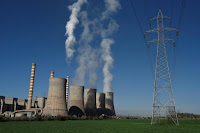Global energy demand continued its sluggish rise last year as growth in Chinese consumption fell to its lowest in nearly two decades, while renewables flourished, BP said in a report on Tuesday.
Slower demand growth helped stall the acceleration of greenhouse gas emissions for a third year to levels not seen since the 1980s, but emissions remained well above targets set out globally under the 2015 Paris accord on climate change.
Coal's share in the energy mix declined to its lowest since 2004 at around 28 percent, while production of the highly polluting fossil fuel saw its largest ever annual drop at 6.2 percent, BP said.
Global energy demand grew by 1 percent in 2016, a rate similar to those seen in the previous two years but well below the 10-year average of 1.8 percent, the British company said in its benchmark Statistical Review of World Energy.
"This is a third year where we've seen weak growth in world energy demand ... The new normal is that all of this growth is coming from developing economies," particularly China and India, BP Chief Economist Spencer Dale told reporters.
China's energy demand growth in 2015 and 2016, 1.2 and 1.3 percent respectively, although still the strongest in the world, marked its lowest over a two-year period since 1997-98.
While that slowdown resulted from sluggish global economic activity, it also stemmed from greater efficiency in engines and factories, he said.
Among fossil fuels, oil demand grew at the fastest annual rate - 1.6 percent - last year as low crude prices boosted consumption.
Oil production grew by half a percent, or 400,000 barrels per day, the lowest gain since 2009, as energy companies slashed spending.
Read more at Global Energy Demand Stumbles for Third Year: BP

No comments:
Post a Comment